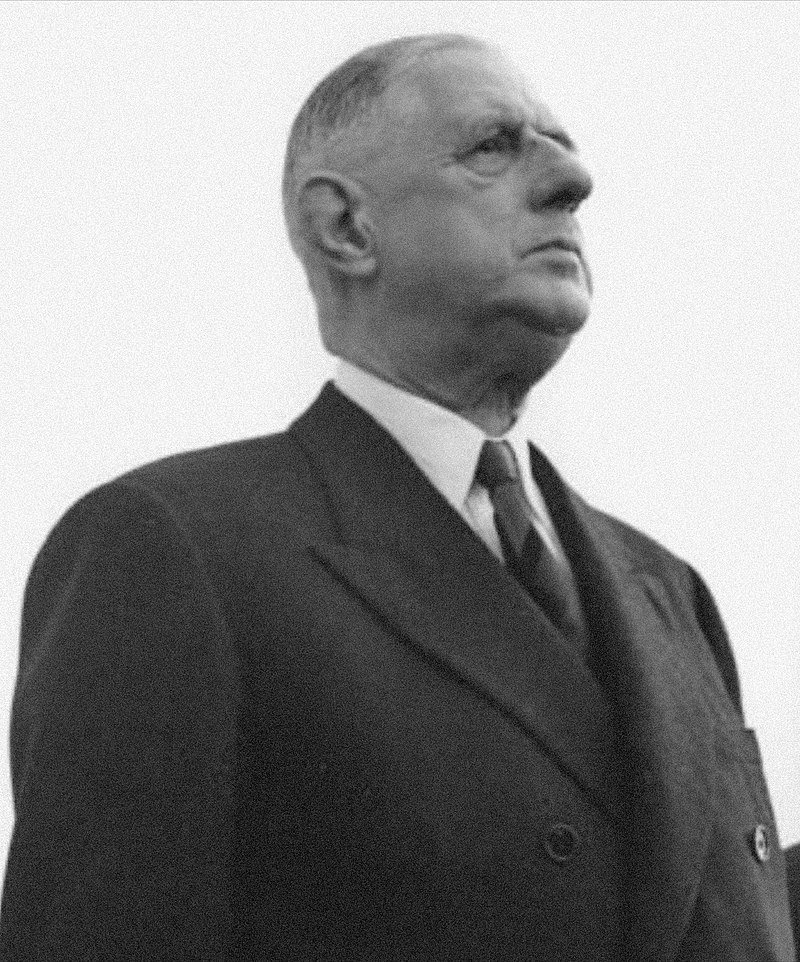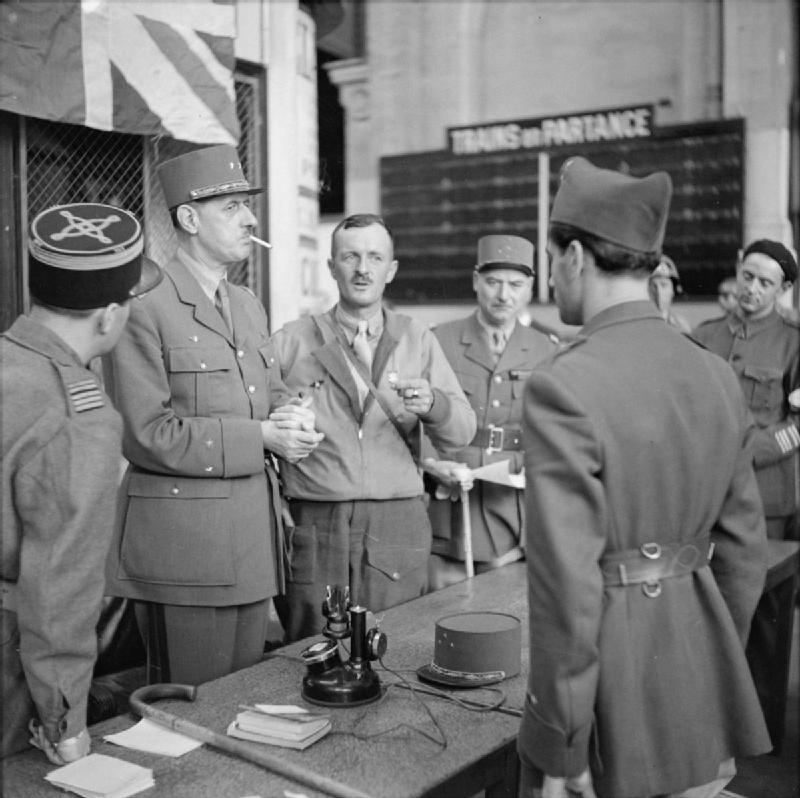Charles de Gaulle

Charles André Joseph Marie de Gaulle (22 November 1890 – 9 November 1970) was a French army officer and statesman who led the Free French Forces against Nazi Germany in World War II, and chaired the Provisional Government of the French Republic from 1944 to 1946 in order to re-establish democracy in France. In 1958, he came out of retirement as President of the Council of Ministers. He rewrote the Constitution of France and founded the Fifth Republic after approval by referendum. He was elected President of France later that year, a position to which he was reelected in 1965 and held until his resignation in 1969. He was the dominant figure of France during the early part of the Cold War era; his memory continues to influence French politics.
Born in Lille, he graduated from Saint-Cyr in 1912. He was a decorated officer of the First World War, wounded several times and later taken prisoner at Verdun. During the interwar period, he advocated mobile armoured divisions. During the German invasion of May 1940, he led an armoured division which counterattacked the invaders; he was then appointed Undersecretary for War. Refusing to accept his government's armistice with Germany, de Gaulle escaped to England and exhorted the French to resist occupation and to continue the fight in his Appeal of 18 June. He led the Free French Forces and later headed the French National Liberation Committee against the Axis. Despite frosty relations with the United States, he generally had Winston Churchill's support and emerged as the undisputed leader of Free France. He became head of the Provisional Government of the French Republic in June 1944, the interim government of France following its Liberation. As early as 1944, de Gaulle introduced a dirigiste economic policy, which included substantial state-directed control over a capitalist economy which was followed by 30 years of unprecedented growth, known as the Trente Glorieuses.
Frustrated by the return of petty partisanship in the new Fourth Republic, he resigned in early 1946 but continued to be politically active as founder of the Rassemblement du Peuple Français (RPF; "Rally of the French People"). He retired in the early 1950s and wrote his War Memoirs, which quickly became a staple of modern French literature. When the Algerian War was ripping apart the unstable Fourth Republic, the National Assembly brought him back to power during the May 1958 crisis. He founded the Fifth Republic with a strong presidency, and he was elected to continue in that role. He managed to keep France together while taking steps to end the war, much to the anger of the Pieds-Noirs (ethnic French born in Algeria) and the military; both previously had supported his return to power to maintain colonial rule. He granted independence to Algeria and acted progressively towards other French colonies. In the context of the Cold War, de Gaulle initiated his "politics of grandeur" asserting that France as a major power should not rely on other countries, such as the United States, for its national security and prosperity. To this end, he pursued a policy of "national independence" which led him to withdraw from NATO's military integrated command and to launch an independent nuclear development program that made France the fourth nuclear power. He restored cordial Franco-German relations to create a European counterweight between the Anglo-American and Soviet spheres of influence through the signing of the Élysée Treaty on 22 January 1963. However, he opposed any development of a supranational Europe, favouring Europe as a continent of sovereign nations. De Gaulle openly criticised the United States intervention in Vietnam and the "exorbitant privilege" of the United States dollar. In his later years, his support for the slogan "Vive le Québec libre" and his two vetoes of Britain's entry into the European Economic Community generated considerable controversy in both North America and Europe.
Although reelected President of the Republic in 1965, he faced widespread protests by students and workers in May 1968, but had the Army's support and won an election with an increased majority in the National Assembly. De Gaulle resigned in 1969 after losing a referendum in which he proposed more decentralisation. He died a year later at his residence in Colombey-les-Deux-Églises, leaving his presidential memoirs unfinished. Many French political parties and figures claim a Gaullist legacy; many streets and monuments in France were dedicated to his memory after his death.
1944–1946: Provisional Government of Liberated France
Roosevelt insisted that an Allied Military Government for Occupied Territories (AMGOT) should be implemented in France, but this was opposed by both the Secretary of War and the Under-Secretary for War, as well as by Eisenhower, who had been strongly opposed to the imposition of AMGOT in North Africa. Eisenhower, unlike Roosevelt, wanted to cooperate with de Gaulle, and he secured a last-minute promise from the President on the eve of D-Day that the Allied officers would not act as military governors and would instead cooperate with the local authorities as the Allied forces liberated French Territory. De Gaulle would later claim in his memoirs that he blocked AMGOT.
With the prewar parties and most of their leaders discredited, there was little opposition to de Gaulle and his associates forming an interim administration. In order not to be seen as presuming on his position in such austere times, de Gaulle did not use one of the grand official residences such as Hotel de Matignon or the presidential palace on the Elysee, but resided briefly in his old office at the War Ministry. When he was joined by his wife and daughters a short while later, they moved into a small state-owned villa on edge of Bois de Boulogne which had once been set aside for Hermann Göring.
Living conditions immediately after the liberation were even worse than under German rule. About 25% of the city was in ruins and public services and fuel were almost nonexistent. Large-scale public demonstrations erupted all over France, protesting the apparent lack of action at improving the supply of food, while in Normandy, bakeries were pillaged. The problem was not French agriculture, which had largely continued operating without problems, but the near-total breakdown of the country's infrastructure. Large areas of track had been destroyed by bombing, most modern equipment, rolling stock, lorries and farm animals had been taken to Germany and all the bridges over the Seine, the Loire and the Rhone between Paris and the sea had been destroyed. The black market pushed real prices to four times the level of 1939, causing the government to print money to try to improve the money supply, which only added to inflation.
On 10 November 1944, Churchill flew to Paris to a reception by de Gaulle and the two together were greeted by thousands of cheering Parisians on the next day. Harold Nicolson stated that Anthony Eden told him that "not for one moment did Winston stop crying, and that he could have filled buckets by the time he received the Freedom of Paris". He said "they yelled for Churchill in a way that he has never heard any crowd yell before". At an official luncheon, de Gaulle said, "It is true that we would not have seen [the liberation] if our old and gallant ally England, and all the British dominions under precisely the impulsion and inspiration of those we are honouring today, had not deployed the extraordinary determination to win, and that magnificent courage which saved the freedom of the world. There is no French man or woman who is not touched to the depths of their hearts and souls by this".




































0 comments
Sign in or create a free account